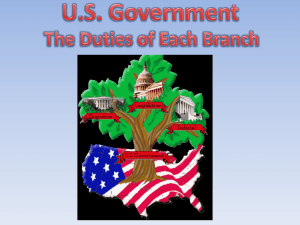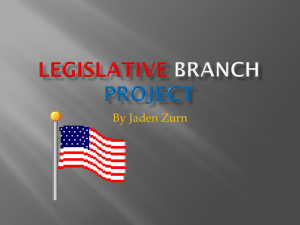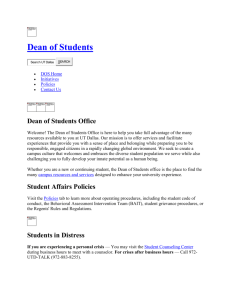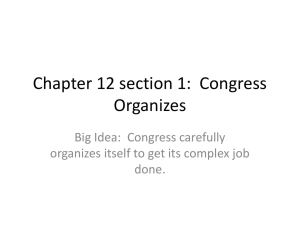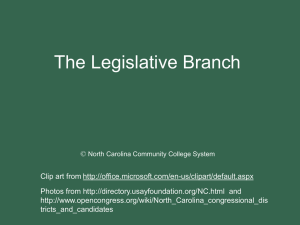Humanities and Sciences Faculty Senate Meeting
advertisement
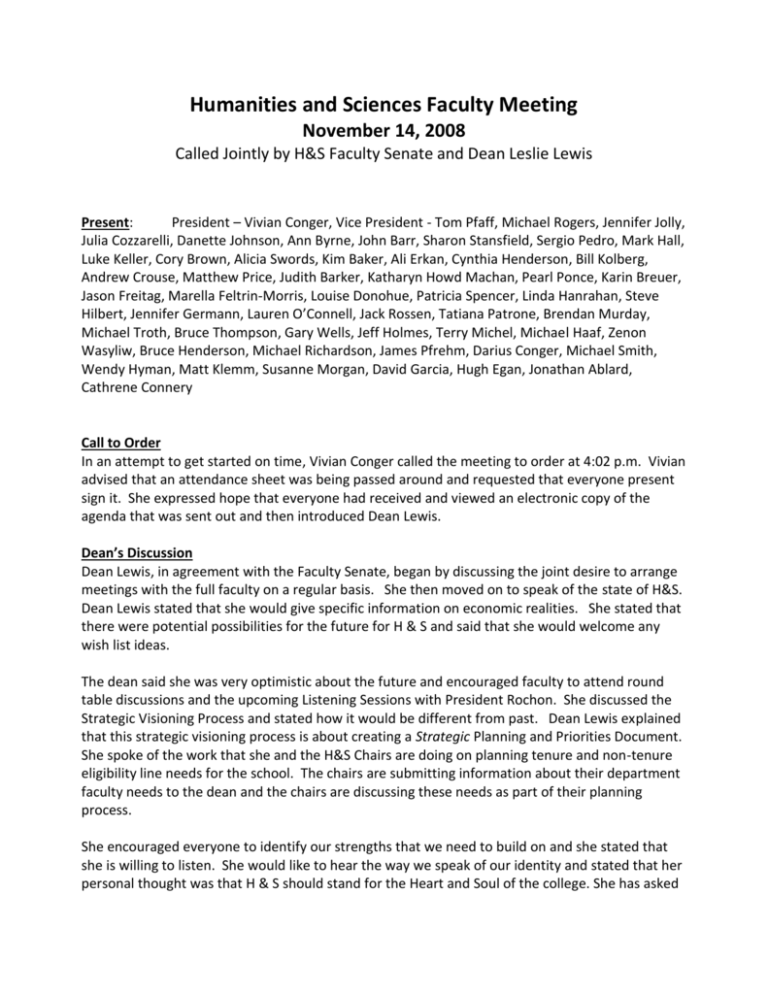
Humanities and Sciences Faculty Meeting November 14, 2008 Called Jointly by H&S Faculty Senate and Dean Leslie Lewis Present: President – Vivian Conger, Vice President - Tom Pfaff, Michael Rogers, Jennifer Jolly, Julia Cozzarelli, Danette Johnson, Ann Byrne, John Barr, Sharon Stansfield, Sergio Pedro, Mark Hall, Luke Keller, Cory Brown, Alicia Swords, Kim Baker, Ali Erkan, Cynthia Henderson, Bill Kolberg, Andrew Crouse, Matthew Price, Judith Barker, Katharyn Howd Machan, Pearl Ponce, Karin Breuer, Jason Freitag, Marella Feltrin-Morris, Louise Donohue, Patricia Spencer, Linda Hanrahan, Steve Hilbert, Jennifer Germann, Lauren O’Connell, Jack Rossen, Tatiana Patrone, Brendan Murday, Michael Troth, Bruce Thompson, Gary Wells, Jeff Holmes, Terry Michel, Michael Haaf, Zenon Wasyliw, Bruce Henderson, Michael Richardson, James Pfrehm, Darius Conger, Michael Smith, Wendy Hyman, Matt Klemm, Susanne Morgan, David Garcia, Hugh Egan, Jonathan Ablard, Cathrene Connery Call to Order In an attempt to get started on time, Vivian Conger called the meeting to order at 4:02 p.m. Vivian advised that an attendance sheet was being passed around and requested that everyone present sign it. She expressed hope that everyone had received and viewed an electronic copy of the agenda that was sent out and then introduced Dean Lewis. Dean’s Discussion Dean Lewis, in agreement with the Faculty Senate, began by discussing the joint desire to arrange meetings with the full faculty on a regular basis. She then moved on to speak of the state of H&S. Dean Lewis stated that she would give specific information on economic realities. She stated that there were potential possibilities for the future for H & S and said that she would welcome any wish list ideas. The dean said she was very optimistic about the future and encouraged faculty to attend round table discussions and the upcoming Listening Sessions with President Rochon. She discussed the Strategic Visioning Process and stated how it would be different from past. Dean Lewis explained that this strategic visioning process is about creating a Strategic Planning and Priorities Document. She spoke of the work that she and the H&S Chairs are doing on planning tenure and non-tenure eligibility line needs for the school. The chairs are submitting information about their department faculty needs to the dean and the chairs are discussing these needs as part of their planning process. She encouraged everyone to identify our strengths that we need to build on and she stated that she is willing to listen. She would like to hear the way we speak of our identity and stated that her personal thought was that H & S should stand for the Heart and Soul of the college. She has asked the Chairs to submit needs wish lists. She is specifically looking for “talking points” that she can bring with her while on development trips. Dean Lewis then began to discuss the economic realities in detail. She talked about the college not reaching the enrollment goal and the effect that had and will have on our current and future budgets. She stated that a budget reduction of 4% was set aside from this year’s budget, which came out of a surplus that H & S had from places such as salary savings when replacing retiring and tenured faculty/staff. She requested all departments to stick to their budget and not to exceed it. She stated that the 2009-2010 budget will probably include the same 4% cut. This future 4% cut is across all of academic affairs. How that plays out for H&S is under discussion. Dean Lewis also stated that projections had been made for three years out at the worst case scenario and that she was very optimistic. She said that we are not “hunkering down,” but rather looking at how we can move forward. H&S need for space is still on the radar screen. She stated that while there is a continual restructuring of the Dean’s office, she does plan to fill the Associate Dean’s position. She thanked those who responded to the need for assistance filling the spring term 2009 associate dean tasks. An email that went out to several faculty members in regards to the position will only reflect the Spring 2009 term as a temporary position. Dean Lewis expressed a need for a systematic school-wide approach to Policies and Procedures (or not if that is what the faculty decide upon). She discussed the fact that several departments have made personnel policy changes that have triggered standard review procedures. During these reviews it became clear that there needs to be a recommendation from the appropriate school wide review body. Dean Lewis sent a memo to the Faculty Senate asking the senate to identify what procedures it will use to handle such reviews. New Business Vivian Conger quoted the purpose of the Faculty Senate. The purpose of the Faculty Senate is to determine and represent the concerns of the Faculty of the School of Humanities and Sciences and to make recommendations on its behalf on school policies and procedures concerning, but not limited to, curriculum, programs, grading, faculty appointments and credentials for same, evaluation of faculty, tenure, and promotion. The school will make no changes in these policies without a recommendation from the Faculty Senate. The Faculty Senate will report its recommendations to the Faculty of the School of Humanities and Sciences and to the dean for action. Vivian stressed that the Faculty Senate wants to hear from faculty. She also highlighted that historically the Faculty Senate and the Dean’s office have not paid attention to the Faculty Senate constitution. She mentioned that Faculty Senate has developed a strong working relationship with Dean Lewis. She stated that Leslie Lewis has approached the Faculty Senate for advice on several issues regarding policies and procedures. She also stated that this all H&S faculty meeting is just the start of having H&S Faculty, Faculty Senate, and the Dean, talking more frequently. Vivian also stated that there are two vacant seats in Faculty Senate – one from Humanities and one from the Social Sciences - both which will serve a three year term. She encouraged faculty to respond to a new call that would go out and then had all the senators stand up. She stated that it is a great time to join Faculty Senate. It will be work, but it is an exciting time. She then introduced Tom Pfaff, Vice President of the Faculty Senate. Tom Pfaff discussed the problem that currently there are two H&S bodies that deal with Policies and Procedures, the Faculty Senate and the Committee on Academic Policies and Procedures (CAPP). The Faculty Senate feels that only one committee is needed and asked the attendees their opinion on whether or not to put out a vote to dissolve CAPP. He mentioned the rationale that was sent out electronically today about dissolving CAPP. Tom highlighted the rationale for dissolving CAPP: We only need one policies and procedures body. Per the Faculty Senate by-laws the Faculty Senate can form a CAPP like body when needed. If there are two similar governance bodies then the Dean can decide which body to work with, which seems problematic from a governance view point. The history of CAPP is intermittent and inconsistent. As far as we can tell CAPP has only convened twice in the past five years. The Faculty Senate is a more representative body then CAPP, with regular meetings, and accessible meeting minutes on the Ithaca College website The Ithaca College policy manual identifies Faculty Senate as the governance body for the School of Humanities and Sciences (Section 1.6.6: School Councils) There were several questions/comments from attendees in which the following points were raised: 1. Would Faculty Senate have sufficient time to work on policies and procedures? 2. Why was CAPP formed? 3. The Faculty Senate should be a voice outside of CAPP. 4. Clarification needed on who is doing what and if a more transparent structure could be created 5. How will new subcommittees of Faculty Senate be formed? Standing committees benefit from having institutional memory. 6. Can Faculty Senate “absorb” CAPP in Faculty Senate as a standing subcommittee? 7. Nomination forms don’t explain the role of the position one is volunteering for. 8. We need to be nimble about how we respond to policies and procedures 9. Can we suggest other committees that we’d like dissolved? 10. This is a pragmatic meeting, but also very symbolic (in a positive way). 11. This meeting is a really good idea; let’s have it regularly. These questions and comments were surrounded by active discussion on the part of the faculty and the faculty senators. The general discussion clarified that CAPP was established in 1990 by a faculty vote and the faculty senate was established in the late 1990’s also by a faculty vote. The general recollection is that faculty senate was created to be a co-governance body while CAPP worked on specific policy and procedures actions. Tom Pfaff clarified that historically H&S has not had a lot of policy and procedure issues addressed by CAPP or Faculty Senate so the workload can be managed by faculty senate. If the workload is large, then faculty senate can form an ad-hoc or standing subcommittee to handle specific policy and procedures issues. Vivian pointed out the fact that the meeting was a good idea and how she would like to keep having them. There were several questions/comments from attendees about points raised by Dean Lewis with Dean Lewis’s response: 1. Is the College reaction to the economy and enrollment situation alarmist? It all depends on enrollment. We are looking at alternate revenue in the form of transfer students and graduate students. 2. When should we voice the perspectives about H&S? Participate in the listening sessions. 3. Will the faculty receive a salary increment this year? Too early to tell; the decisions will probably come later (after the enrollment situation is clearer). 4. Is the down turn in enrollment just happening to us? It is happening to many, but for us it was a perfect storm. 5. How does Ithaca College’s budget respond to tuition versus our endowment? It is actually a good time to be tuition dependent if we can hit our enrollment numbers. 6. What is the distribution of short falls in enrollment? Leslie will check with institutional research to get hard numbers, but H&S is not as bad as others. 7. How are we recruiting? What role can H&S play to help? This conversation is happening. 8. How does H&S get involved in the revamp of the Tours? H&S is working on a total H&S marketing plan. The tour guides are going to be trained and paid, which should improve the tours. 9. Will we get to a 3-3 teaching load? We are still looking at it. The meeting adjourned at 5:00 p.m.



